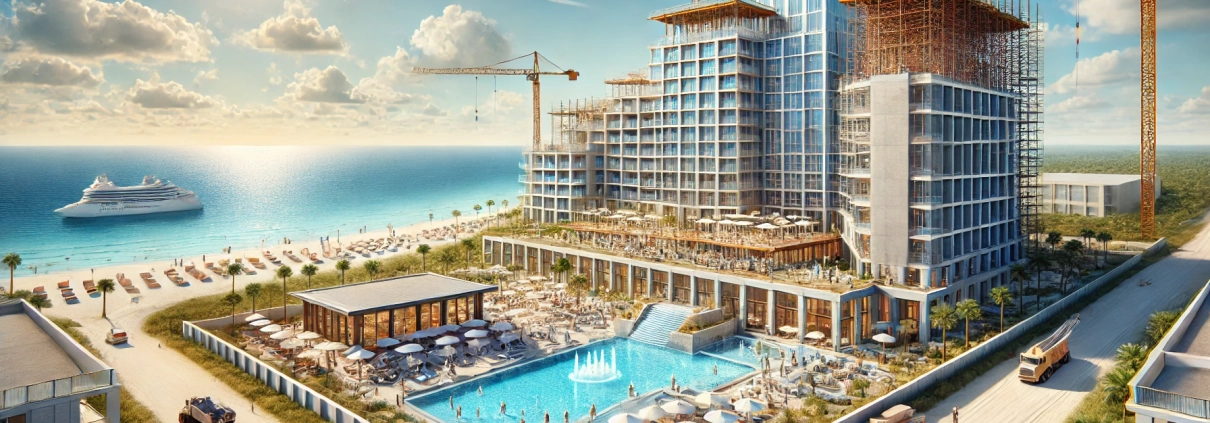Guaranteed Maximum Price (GMP)
A type of cost plus contract whereby the contractor is reimbursed for all construction related costs, plus a fixed fee. The agreed upon costs and fee are capped, transferring the risk of cost overruns to the contractor, whilst any savings resulting from cost underruns may either be a point of negotiation between the general contractor and the owner or completely realized by the project owner.
Putting “Guaranteed Maximum Price (GMP)” in Context
Coastal Horizon Developments is embarking on the construction of Oceanfront Serenity Resort, a luxury resort in Florida. This $120 million project is set to include 250 guest rooms, multiple dining establishments, a spa, conference facilities, and a signature beachfront infinity pool. The development is strategically located along Florida’s Gulf Coast, capitalizing on the region’s tourism demand and year-round warm climate.
To manage construction risks effectively, Coastal Horizon Developments opted for a Guaranteed Maximum Price (GMP) contract with Sunbelt Construction, a regional general contractor with significant experience in large-scale hospitality projects. Under this contract, Sunbelt Construction is reimbursed for all project costs, such as labor, materials, and subcontractors, and receives a fixed fee of $6 million for managing the project. However, the total costs, including the fixed fee, are capped at $120 million, ensuring Coastal Horizon has a predictable budget and protection against cost overruns.
Benefits of Using GMP in This Context
- Risk Mitigation for Cost Overruns: Any costs exceeding $120 million, such as unexpected price spikes in construction materials or unforeseen site conditions, are borne by Sunbelt Construction. This transfers significant financial risk from Coastal Horizon to the contractor, providing greater budget certainty for the developer.
- Incentives for Cost Savings: If the total project costs come in under $120 million, the GMP contract allows for a negotiation of how the savings are shared. In this case, Coastal Horizon negotiated a 70/30 split, where 70% of any cost underruns would benefit the developer, and 30% would be retained by Sunbelt Construction as an additional incentive.
Hypothetical Scenario of GMP in Action
Midway through construction, Sunbelt Construction encounters unexpected challenges related to soil stabilization. These issues require an additional $1.5 million in remedial work. Because the contract is structured as GMP, Sunbelt absorbs these costs, and the total project budget for Coastal Horizon remains unaffected.
Conversely, the project finishes two months ahead of schedule, with costs totaling $118 million instead of the $120 million cap. As per the negotiated terms, Coastal Horizon realizes a $1.4 million savings, while Sunbelt Construction earns an additional $600,000 as part of the shared savings agreement.
Formula for Shared Savings Calculation:
- Savings to Developer: Total Savings × Developer’s Share
- Savings to Contractor: Total Savings × Contractor’s Share
For this project:
- Total Savings = $120 million (GMP cap) – $118 million (actual cost) = $2 million
- Savings to Developer = $2 million × 70% = $1.4 million
- Savings to Contractor = $2 million × 30% = $600,000
This structured approach incentivizes efficiency while protecting the developer from unexpected cost escalations.
Frequently Asked Questions about Guaranteed Maximum Price (GMP)
What is a Guaranteed Maximum Price (GMP) contract?
A GMP contract is a type of cost-plus agreement where the contractor is reimbursed for all construction-related costs plus a fixed fee, but the total cost is capped. This protects the owner from cost overruns and transfers that risk to the contractor.
Who bears the risk of cost overruns in a GMP contract?
In a GMP contract, the contractor bears the risk of cost overruns. If project expenses exceed the guaranteed maximum price, the contractor absorbs the excess costs.
Can savings be shared under a GMP contract?
Yes. GMP contracts often include provisions for sharing cost savings between the owner and contractor. For example, a 70/30 split allows the owner to retain 70% of the savings and the contractor 30%.
How does GMP benefit a real estate developer?
It offers cost certainty and budget control. Developers are protected from cost overruns and can also benefit from cost savings through negotiated sharing arrangements.
What happens if unexpected issues increase construction costs?
If issues arise, such as unforeseen site conditions, the contractor absorbs those costs as long as the total remains within the GMP cap. For example, Sunbelt Construction absorbed $1.5 million in additional soil stabilization costs.
Is GMP commonly used in large-scale developments?
Yes. Developers often use GMP for large or complex projects like the $120 million Oceanfront Serenity Resort to mitigate risk and align incentives between themselves and the contractor.
Click here to get this CRE Glossary in an eBook (PDF) format.

